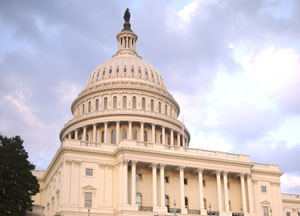With officials from both parties considering cuts to entitlement programs as part of a deal to raise the federal debt ceiling, advocates for seniors are taking their message to Capitol Hill Wednesday to press Congress about the impact of potential cuts to Medicaid and Medicare.

Photo by Karl Eisenhower/KHN
About 250 members of the National Association of Agencies on Aging, also known as n4a, are expected on the Hill as the group’s annual conference in Washington comes to an end.
“In the midst of this debate, we already know that we’ve been compromised in our ability to reach out and serve everybody who needs our services,” Sandy Markwood, CEO of the association, said to members Tuesday.
A survey conducted by the association in 2010 found that Area Aging Agencies suffered substantial losses in local funding as a result of the economic downturn. Forty-eight percent reported that they had cut services, and almost a fifth eliminated some programs altogether. At the same time, about half had increased caseloads and instituted waitlists for some of their services, while most were reducing staff, according to Markwood.
Those cuts, she said, are endangering the programs. But concern is also turning to federal funding for programs for seniors and the possibility that broad programs, such as Medicare, could be cut, even as the number of seniors swells with the aging of the Baby Boom generation. “We’re facing huge and dramatic potential cuts in our federal funding, right at the same time that we have the huge demand in our population of people who are going to need them,” she added.
At one session during the meeting, Robert Greenstein of the Center on Budget and Policy Priorities pointed out that even if officials reach an agreement and the debt ceiling is raised, some of the solutions currently on the table provide a short-term fix that would leave legislators in the same position come 2013.
Among the proposals that have been floated is raising the eligibility age for Medicare to 67. That would result in two-thirds of 65- and 66-year-olds paying more out-of-pocket healthcare costs, according to a forecast by the Kaiser Family Foundation. Tricia Neuman, vice president of the foundation, told n4a members arguments that seniors are better off financially than most Americans or have no “skin in the game” when it comes to using healthcare services are misguided. Kaiser Health News is a independent program of the Kaiser Family Foundation.
Another option favored by Republicans—giving state block grants to cover Medicaid costs—is something to be wary of, said Bruce Chernof of the SCAN Foundation, a foundation that focuses on senior issues. They “sound simplistically valuable, but they create very important challenges on the delivery side,” he said.
In the past weeks, several groups –including Medicaid advocates, hospitals and other health care providers, the pharmaceutical industry, and the AARP—have also expressed concern over the effects of the proposed cuts.
On Tuesday, Markwood urged the members of the National Association of Aging Agencies to join those groups.
“It’s my fear that if we go down that route, what’s going to end up happening is that it may not be in 2013, but 2012 that we have to revisit this and fix all of the mistakes that were instituted as we tried to respond to a fiscal crisis, but we left the human factor out,” Markwood said.






